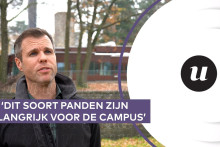What kind of psychological experiment is it?
`The research is about the use of virtual reality within the medical curriculum, for example the UT Technical Medicine program. Students who learn how to cut virtually can see depth differences that are impossible to assess on a normal computer monitor. The question that we are trying to answer is whether virtual learning is useful in the medical area. There are already people being trained with these techniques, but no one has ever determined whether it actually works.'
Virtual cutting does have advantages, doesn't it?
`Obviously. Students can practice a lot, but the stress of working on a real patient is missing.'
How is the experiment executed?
`There are two experiments. The first is an experiment designed to select test subjects. Some people have a good spatial perception, others don't. For the experiments we need a good mix of both. For example, it is widely known that boys generally have better spatial perception than girls. A total of 32 participants is needed to do tasks for the real experiment that require the use of visual spatial perception.'
How?
`They'll be presented with a series of anatomical objects from the abdomen, such as the kidneys. They'll be able to perform a number of actions on the organs using a mouse. `
When will the results be available?
`I'll be able to get working as soon as the statistics are available. The results will be used for my PhD research into the use of virtual reality in learning medical procedures.'
Trans. Jeroen Latour







